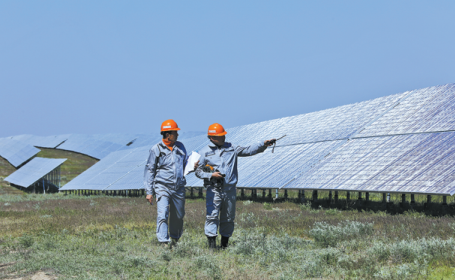Clean-energy cooperation win-win for two nations


Energy has been an anchor in ties between China and Central Asian countries over the past 30 years and their cooperation in this sector has evolved from oil to petrochemicals, hydrocarbons and renewable energy.
Since the establishment of diplomatic ties in 1992, China and Kazakhstan have agreed to support their economic entities by carrying out several energy cooperation projects, said Usen Suleimen, a senior Kazakh diplomat.
The most significant Chinese investments, amounting to hundreds of millions of dollars, are being made in the construction of solar and wind power plants in Kazakhstan.
Chinese companies such as Universal Energy, Risen Energy and State Power Investment Corp, have become major investors in solar and wind power plants in the country.
For Maksat Abilgaziev, such cooperation has changed his life.
Living in Zhanatas, a small town in southern Kazakhstan where the wind blows all year round, he used to be an electrical engineer at a local phosphate mine company.
Zhanatas was once a center of phosphate rock mining and fertilizer production, but it witnessed big job losses following the decline of the industries.
Abilgaziev said he was impressed when the first turbine of the town's 100-megawatt wind power project arrived, with the 60-meter-long blades covering an area as big as the London Eye observation wheel.
He said he believes the future of his hometown and Kazakhstan lies in clean energy, especially in wind energy. So in 2020, the then 30-year-old became a trainee responsible for maintaining and repairing wind turbines at the wind farm and learned about related maintenance work from Chinese experts.
Rinat Turganbekov works at the Kapshagay photovoltaic power station, one of the largest single solar power projects in Kazakhstan.
The power station is a part of the China-Kazakhstan green energy cooperation initiative, jointly invested and constructed by Universal Energy and its Kazakh counterparts.
As a senior employee of Universal Energy Kazakhstan, Turganbekov has witnessed the remarkable transformation brought about by solar power stations, providing locals with green and affordable electricity.
Meanwhile, under the China-proposed Belt and Road Initiative, a series of cooperative efforts aimed at sustainable development are writing a new chapter of mutual benefit and win-win cooperation.
"Chinese companies have brought significant changes to my life," said the 36-year-old, who studied in Tianjin and is proficient in Chinese.
Initially, he worked as a translator at the company. During his tenure, his Chinese colleagues encouraged him to venture into project coordination.
During his five years with the Chinese company, Turganbekov saw his income increase, and he managed to purchase a home in Almaty.
"With the establishment of solar and wind power stations by Chinese enterprises, residents in the southern regions, where there had historically been a deficit of electricity, no longer contend with electricity shortages," he said.
































